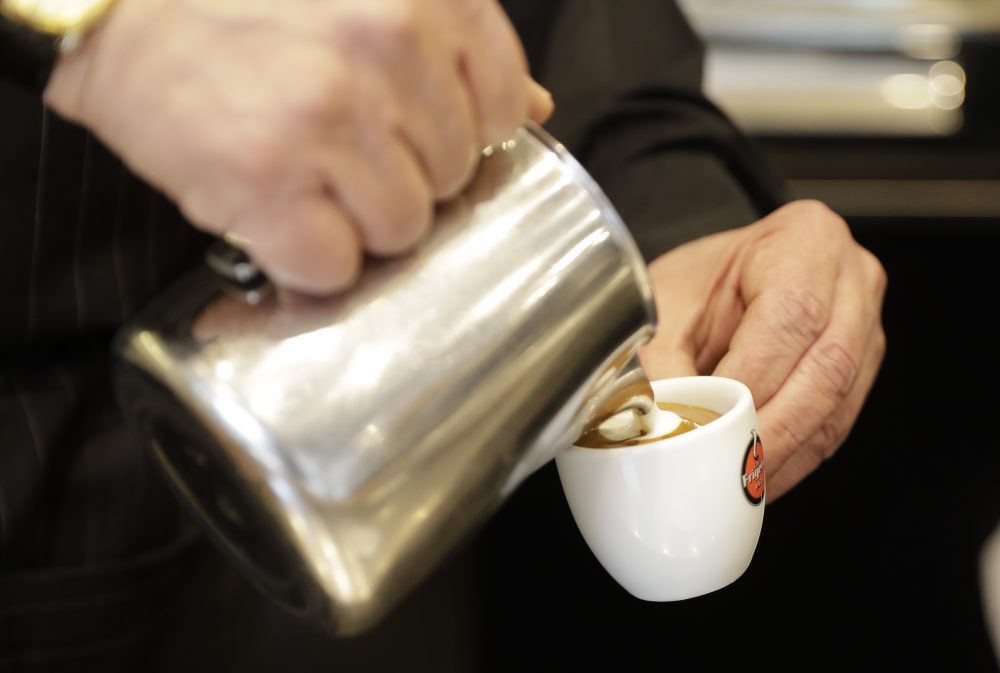Advertisement
Multiple Cups Of Coffee — Brewed Or Instant, Caf Or Decaf — May Be Good For You, Study Finds

A big study adds to the recent spate of coffee-is-good-for-you news: The new data suggest that a cup a day — or two or four or eight — might actually be good for you.
Well, maybe not good for you, specifically; it might make you jittery or have trouble sleeping. There are plenty of personal sensitivities to coffee and caffeine.
But the study in the journal JAMA Internal Medicine looks at the very big picture. It includes about half a million Brits who contributed their data and DNA to the U.K. biobank, and it finds an inverse relationship between people drinking up to eight or more cups per day and all-cause mortality. So if you drank that coffee, you had a slightly lower chance of dying during the 10 years the study examined.
Among the most striking findings in the study: It didn't matter whether you drank caffeinated or decaffeinated coffee, and it didn't matter whether you drank instant or brewed coffee. You still got that slightly lower chance of dying.
So the study seems to suggest you can get much the same health benefits from cheap supermarket coffee as from a fancy cup of artisanal terroir coffee.
That may surprise you if instant coffee tastes awful to you and some brewed coffee tastes heavenly. But it wasn't surprising to local nutrition experts I spoke with, including Ed Giovannucci, a professor of epidemiology and nutrition at the Harvard Chan School Of Public Health.
"There are many potential beneficial compounds in coffee — there are literally hundreds and thousands of compounds in coffee," he said. "People think of caffeine, but it's likely that some of the most beneficial compounds are not the caffeine."
You may have heard about the plant compounds called phytochemicals in coffee; such basic elements remain whether coffee is caffeinated or not, and whether you use a $5,000 espresso machine or you pour some hot water onto some powder.
"The compounds actually don't change too much from the processing," Giovannucci said. "The tastes may vary depending on how you drink the coffee; the chemical compounds that may be beneficial probably don't change as much, so regardless of how you drink coffee, you're probably going to get most of the benefits."
One other thing that didn't matter in this study: your DNA. The study looked at some common gene variations that help determine whether someone metabolizes caffeine quickly or slowly, but didn't find any difference in health risk.
Years ago, health concerns about coffee included fears that it might raise risk of pancreatic cancer and other diseases. But though it annoys us when it flip-flops, science does advance.
"Early on, there were some reports of potential adverse effects as far as coffee and health outcomes," said Alice Lichtenstein, the Gershoff Professor of nutrition science and policy at Tufts University. "But when the data were looked at more carefully, and more factors were controlled for, and more contemporary methods of producing the coffee and consuming the coffee were taken into consideration, it seems not only were those potential negative effects not corroborated, but it turns out that a lot of positive effects of coffee were identified."
Advertisement
She calls this new study the most comprehensive one to date on this topic, among many smaller ones.
And she notes that it's a rare treat when there's something that feels good and actually is good for us. If there were a big study on fruits and vegetables lowering the risk of dying, we'd all just shrug, she said.
"But here's a situation where there was always some feeling of, 'Oh, can't be — I enjoy it too much, it can't be good for me.' And now we're finding out that it's good. So I think we should relax and enjoy it — but also use common sense."
That means, for example, if you're adding 500 calories of cream and sugar to a coffee beverage the size of a Big Gulp, you might want to keep an eye on that. The study did not distinguish between, say, an espresso and a frappuccino. It used participants' own reports of how many cups of coffee they drank per day.
The researchers (who, by the way, are federal scientists, not from anything like the Starbucks Institute for Coffee Research) say there is data on diet about some of the study participants that could be mined to parse apart the difference between people who have, say, cappuccinos or lattes or espressos. A deeper look into diet could also cast light on whether the people who drink coffee also have other characteristics that may be the real reasons they were less likely to die during the study.
On the basis of this study, some people who were holding back on coffee because of lingering health concerns may want to drink a little more if they want to, professor Lichstenstein says.
"But," she added, "I would also suggest if someone doesn't enjoy coffee, the data are not strong enough that they should start drinking coffee."
